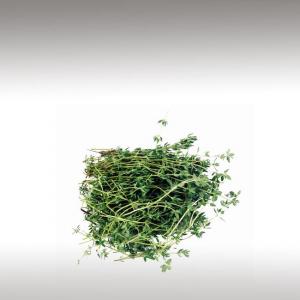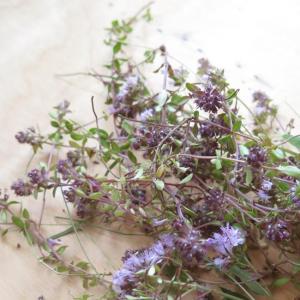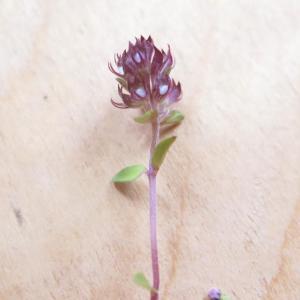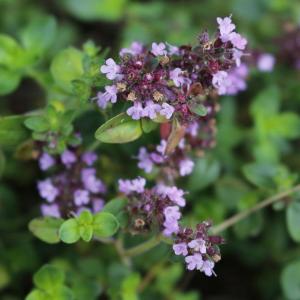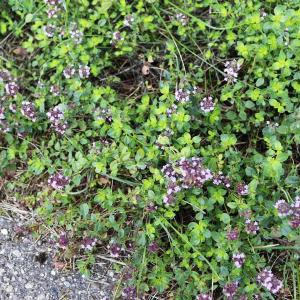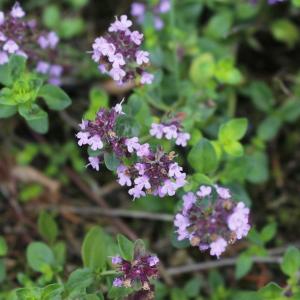
THYME ESSENTIAL OIL (THYMUS VULGARIS) - ESSENTIAL OILS

BASE / GENERAL DATA
Information submited: May 5, 2014 Modified: March 13, 2018 By: OperaDreamhouse
Botanical Name: Thymus vulgaris
Common Method of Extraction: Steam Distilled
Part Typically Used: Inflorescences
Color: Reddish-brown to amber
Consistency: Slightly oily feeling
Perfumery Note: Middle
Strength of Initial Aroma: Sweet, strongly herbal smell
Chemical structure: The main chemical components are a-thujone, a-pinene, camphene, b-pinene, p-cymene, a-terpinene, linalool, borneol, b-caryophyllene, thymol and carvacrol.
Thyme oil is extracted from Thymus Vulgaris of the Labiatae family and is also known as common or Red Thyme.
It has a rather sweet, yet strongly herbal smell and is reddish-brown to amber in color. It is extracted from the fresh or partly dried flowering tops and leaves of the plant by water or steam distillation and the yield is 0,7 -1,0 %.
Common Method of Extraction: Steam Distilled
Part Typically Used: Inflorescences
Color: Reddish-brown to amber
Consistency: Slightly oily feeling
Perfumery Note: Middle
Strength of Initial Aroma: Sweet, strongly herbal smell
Chemical structure: The main chemical components are a-thujone, a-pinene, camphene, b-pinene, p-cymene, a-terpinene, linalool, borneol, b-caryophyllene, thymol and carvacrol.
Thyme oil is extracted from Thymus Vulgaris of the Labiatae family and is also known as common or Red Thyme.
It has a rather sweet, yet strongly herbal smell and is reddish-brown to amber in color. It is extracted from the fresh or partly dried flowering tops and leaves of the plant by water or steam distillation and the yield is 0,7 -1,0 %.

SPIRITUAL PRACTISES DATA
Information submited: July 8, 2014 Modified: March 13, 2018 By: OperaDreamhouse
The name is derived from the Greek word "Thymos" that means "Perfume" and was used as an incense in Greek temples. The Egyptians used it in embalming process.
The ancient Greeks used it in their baths and burnt it as incense in their temples, believing it was a source of courage.
In the European Middle Ages, the herb was placed beneath pillows to aid sleep and ward off nightmares.
In Middle Ages women would also often give knights and warriors gifts that included Thyme leaves, as it was believed to bring courage to the bearer. Thyme was also used as incense and placed on coffins during funerals, as it was supposed to ensure passage into the next life.
Thyme is used to establish a sense or a feeling of direction for the spirit. Thymus Vulgaris has great value to help with concentration and to focus.
In meditation process fits for Heart and Solar Plexus Chakras.
The ancient Greeks used it in their baths and burnt it as incense in their temples, believing it was a source of courage.
In the European Middle Ages, the herb was placed beneath pillows to aid sleep and ward off nightmares.
In Middle Ages women would also often give knights and warriors gifts that included Thyme leaves, as it was believed to bring courage to the bearer. Thyme was also used as incense and placed on coffins during funerals, as it was supposed to ensure passage into the next life.
Thyme is used to establish a sense or a feeling of direction for the spirit. Thymus Vulgaris has great value to help with concentration and to focus.
In meditation process fits for Heart and Solar Plexus Chakras.

MEDICINE / HEALTH DATA
Information submited: July 8, 2014 Modified: March 2, 2018 By: OperaDreamhouse
Thymus vulgaris essential oil is antifungal, antiviral, antiparasitic, antimicrobial, antiseptic, anti-aging.
Thyme is recorded in Ebers Papyrus, one of the oldest Egyptian medical texts on record. Ebers Papyrus dates to about 1550 BC and contains over 700 remedies for almost everything including cancer, asthma and of course, embalming.
It is an ancient herb used in medicine by the Greeks and the Romans too. Before the advent of modern antibiotics, oil of Thyme was used to medicate bandages.
Thyme oil is beneficial to boost the immune system and can help fight colds, flu, infectious diseases and chills and as a urinary antiseptic, it is very helpful for cystitis and urethritis.
An excellent bronchial and lung stimulant, making it valuable in bronchitis, coughs, colds, asthma and the like, while the warming qualities are great for rheumatism, sciatica, arthritis and gout.
The warming effect of this oil can help in cases of poor circulation, as well as for arthritis, rheumatism, gout, muscular aches and pains, sprains and sport injuries. It is also helpful for cellulite, anorexia, obesity and edema and in cases of scanty periods, leucorrhoea, and to speed up birth and to expel afterbirth.
Thyme oil strengthens the nerves, aids memory and concentration, can help with the feeling of exhaustion and combats depression, while it fortifies the lungs and helps with colds, laryngitis, sinusitis, catarrh, whooping cough, sore throats and tonsillitis. A tea made by infusing the herb in water can be used for coughs and bronchitis.
As a blended massage oil it can assist with arthritis, bronchitis, colds, flu, coughs, gout, bruises, eczema, mucus congestion, muscular aches and pains, obesity and rheumatism.
Thyme essential oil also is known for being a powerful liver detoxifier, immune system stimulant, and antimicrobial. Thyme stimulates blood circulation.
Thyme oil can assist with nervous complaints, respiratory problems, poor circulation and problems of the digestive system and the urinary tract.
Diluted as a mouthwash or as a gargle, Thyme oil can help with gum infections and tonsillitis.
Whilst some phenols are toxic and corrosive, others are believed to be involved in cancer prevention.
Side effects: It is a very potent oil and should not be used during pregnancy or in cases of high blood pressure. Because of the phenols (carvacrol and thymol), which can irritate mucus membranes and cause skin irritation, it should not be used for skin care products, and in general should be used in low concentrations.
Thyme is recorded in Ebers Papyrus, one of the oldest Egyptian medical texts on record. Ebers Papyrus dates to about 1550 BC and contains over 700 remedies for almost everything including cancer, asthma and of course, embalming.
It is an ancient herb used in medicine by the Greeks and the Romans too. Before the advent of modern antibiotics, oil of Thyme was used to medicate bandages.
Thyme oil is beneficial to boost the immune system and can help fight colds, flu, infectious diseases and chills and as a urinary antiseptic, it is very helpful for cystitis and urethritis.
An excellent bronchial and lung stimulant, making it valuable in bronchitis, coughs, colds, asthma and the like, while the warming qualities are great for rheumatism, sciatica, arthritis and gout.
The warming effect of this oil can help in cases of poor circulation, as well as for arthritis, rheumatism, gout, muscular aches and pains, sprains and sport injuries. It is also helpful for cellulite, anorexia, obesity and edema and in cases of scanty periods, leucorrhoea, and to speed up birth and to expel afterbirth.
Thyme oil strengthens the nerves, aids memory and concentration, can help with the feeling of exhaustion and combats depression, while it fortifies the lungs and helps with colds, laryngitis, sinusitis, catarrh, whooping cough, sore throats and tonsillitis. A tea made by infusing the herb in water can be used for coughs and bronchitis.
As a blended massage oil it can assist with arthritis, bronchitis, colds, flu, coughs, gout, bruises, eczema, mucus congestion, muscular aches and pains, obesity and rheumatism.
Thyme essential oil also is known for being a powerful liver detoxifier, immune system stimulant, and antimicrobial. Thyme stimulates blood circulation.
Thyme oil can assist with nervous complaints, respiratory problems, poor circulation and problems of the digestive system and the urinary tract.
Diluted as a mouthwash or as a gargle, Thyme oil can help with gum infections and tonsillitis.
Whilst some phenols are toxic and corrosive, others are believed to be involved in cancer prevention.
Side effects: It is a very potent oil and should not be used during pregnancy or in cases of high blood pressure. Because of the phenols (carvacrol and thymol), which can irritate mucus membranes and cause skin irritation, it should not be used for skin care products, and in general should be used in low concentrations.

BEAUTY / COSMETICS DATA
Information submited: July 8, 2014 Modified: March 13, 2018 By: OperaDreamhouse
Thymus Vulgaris essential oil can cause skin irritation (easily lead to skin irritation).
But this essential oil fits for hair treatment. Thyme stimulates blood circulation. Therefore rubbing an oil that contains Thyme onto your scalp promotes the delivery of nutrients to the scalp and encourages hair growth.
Thyme is known to help with dandruff problems and to clear dirt from the scalp. Thyme essential oil is very good from hair loss.
One study by Leeds Metropolitan University found that thyme may be beneficial in treating acne.
Thymus Vulgaris essential oil have antioxidant properties and to slow down the aging process.
But this essential oil fits for hair treatment. Thyme stimulates blood circulation. Therefore rubbing an oil that contains Thyme onto your scalp promotes the delivery of nutrients to the scalp and encourages hair growth.
Thyme is known to help with dandruff problems and to clear dirt from the scalp. Thyme essential oil is very good from hair loss.
One study by Leeds Metropolitan University found that thyme may be beneficial in treating acne.
Thymus Vulgaris essential oil have antioxidant properties and to slow down the aging process.

FOOD / COOKING DATA
COMMENTS
No comments.


